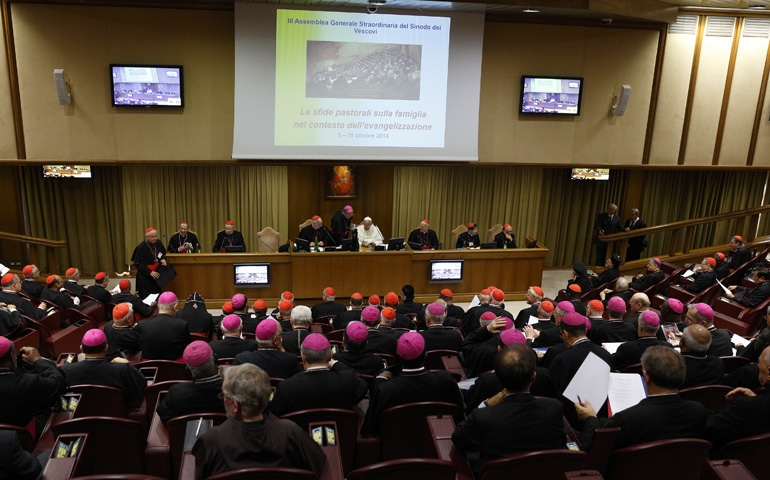
The following editorial by Father Peter Stravinskas, Ph.D., S.T.D., appears in the current (May/June) issue of The Catholic Response magazine. It is posted here with Father’s permission.
When the Extraordinary Synod on the Family was announced and when it concluded, I promised our readers ongoing reflections on the Church’s understanding of marriage and the family, particularly as a preparation for the Ordinary Synod on the topic this coming October. Please allow the present piece to serve as part of that process.
Throughout these months, Pope Francis has consistently asked the faithful to participate in the Synod by offering input and by praying. Here is my contribution, which I present for your consideration.
Most objective observers have noted that the Synod of 2014 was chaotic and confusing at best, characterized by a lack of genuine leadership and disgraceful manipulation by a handful of ideologues. An inordinate amount of attention was given to concerns marginal to the average person in the pews. To be sure, the Church must exhibit pastoral solicitude for those living in irregular situations, whether that is of the divorced/remarried or those in same-sex unions. However, a topsy-turvy impression was created that those issues (which involve an infinitesimal percentage of Catholics) were paramount. On the other hand, where was the pastoral solicitude and robust pastoral advice for the millions of good, struggling Catholic families? It seems to me that the following elements ought to be part of such a plan.
• Starting in childhood, provision of lifelong formation in Christian discipleship and the insertion of the married vocation within that horizon.
• Therefore, stressing the importance of Catholic schools as the indispensable support for parents. The virtual absence of this component from the various Synod documents and even, presumably,from the Synod debates was quite remarkable to me.
• Education in chastity for adolescents and young adults. If this plank of the program were in place, many other aspects would fall into place automatically.
• Ongoing preaching and teaching by the clergy on the Catholic vision of marriage and the family, giving intelligent and comprehensible explanations of the Church’s understanding of human sexuality.
• Serious and solid marriage preparation, including basic catechesis. It is pastorally irresponsible and grossly unjust to allow couples to enter upon a sacramental union after but a handful of “Pre-Cana” sessions. Truth be told, the average couple of my experience is relatively clueless about the very basics of the Christian Faith, let alone the finer points of the marital vocation.
• Special attention needs to be given to ecumenical and interfaith marriages, which are in the majority in many countries nowadays. It was commonplace in the United States up through the 1950s that the non-Catholic partner became a Catholic even before the marriage was solemnized. Now it is regrettably common that the Catholic spouse converts to the faith of the other person or both spouses simply opt out of “organized religion,” joining the growing ranks of the “nones.”
• Programs ought to be established to assist couples in troubled relationships — before it is too late. A “mentor” couple could be assigned to the engaged, who accompany the newly-weds for at least the first five years of the marriage, hopefully becoming an intimate part of the lives of the young couple and thus a permanent resource.
• Parenting courses are essential today. All too many of the current crop of young marrieds were poorly raised and thus have no background to be good parents themselves. This kind of course could begin in the baptismal preparation programs that are standard in most parishes at present, continuing in the various stages of the children’s development, on into adolescence. Especially needed is assistance in how to introduce children to a life of faith, dissuading parents from ever imagining that allowing children to go unaided in the process (on the pretext of giving them “freedom of choice”) is a loving act.
• Parents likewise need help in dealing with the sad phenomenon of adult children who have fallen away from the practice of the Faith. Good Catholic parents wonder what they did wrong for such a result; the Church needs to be present to them with consoling and practical counsel.
• A lasting contribution of the 2015 Synod should be the production of a Compendium of Catholic Teaching on Marriage and the Family. At the Synod of 1985, Cardinal Bernard Law suggested the publication of a catechism to enshrine Catholic doctrine in a format which would instruct generations of Catholics, precisely to honor the twentieth anniversary of the conclusion of the Second Vatican Council. We also have the Compendium of the Social Doctrine of the Church, as well as the Enchiridion of the New Evangelization. My proposal for a Compendium on the Family would be a fitting homage for the fiftieth anniversary of the close of Vatican II, which had so much to say about Catholic family life.
• Last but not least, Synod affairs need to be conducted in total transparency. The faithful have a right to know what their bishops think and say. The shroud of secrecy surrounding the last Synod’s proceedings aided and abetted cloak-and-dagger rumors and actual dishonest dealings.
If you find merit in any or all of these suggestions, let me make one further suggestion: Submit your thoughts to the bishops who will be representing the United States hierarchy at the Synod: Archbishop Joseph Kurtz (Louisville) and Cardinal Daniel DiNardo (Galveston-Houston), president and vice-president, respectively, of the United States Conference of Catholic Bishops; Archbishop Charles Chaput (Philadelphia); Archbishop José Gomez (Los Angeles). And, yes, by all means, storm Heaven, that the Holy Spirit will use the Synod Fathers of 2015 to advance the very sane and joyful truths of Christian family living. And, above all… remember that our Eucharistic Lord accompanies us — His Church — along the pathways of this life, toward His Heavenly Kingdom.


